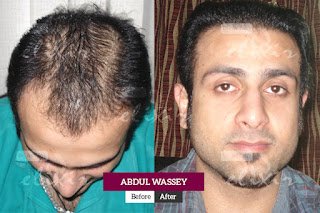Restoring confidence through a hair transplant can be a viable option for individuals experiencing hair loss. Hair loss can have a significant impact on self-esteem and confidence, and a hair transplant is one of the surgical interventions available to address this issue. Here are some key points to consider:
Understanding Hair Loss:
It's important to identify the cause of hair loss before considering a hair restoration in Islamabad. Common causes include genetics (androgenetic alopecia), hormonal changes, medical conditions, or trauma. Consulting with a dermatologist or a hair loss specialist can help determine the cause and the most suitable treatment.
Hair Transplant Procedure:
Hair transplantation involves moving hair follicles from one part of the body (usually the back or sides of the scalp) to the balding or thinning areas. There are two primary methods: Follicular Unit Transplantation (FUT) and Follicular Unit Extraction (FUE). FUE is more commonly preferred today due to its less invasive nature and minimal scarring.
Choosing a Qualified Surgeon:
Selecting a skilled and experienced surgeon is crucial for a successful hair transplant. Research potential surgeons, read reviews, and ask for before-and-after photos of their previous work. Ensure that the surgeon is board-certified and has expertise in hair restoration procedures.
Realistic Expectations:
It's important to have realistic expectations about the outcome of a hair transplant. While the procedure can provide significant improvement, it may not result in a full head of hair or guarantee permanent results. The success of the transplant can depend on factors such as the extent of hair loss, the quality of the donor hair, and individual healing responses.
Post-Operative Care:
Following the transplant, proper post-operative care is essential for optimal results. This may include taking prescribed medications, avoiding strenuous activities, and following the surgeon's instructions for washing and caring for the transplanted area.
Patience is Key:
Hair growth after a transplant takes time, and patients need to be patient. It can take several months for the transplanted hair to grow and achieve a natural appearance. Understanding and accepting this timeline is crucial for managing expectations.
Non-Surgical Options:
In addition to surgical options, non-surgical treatments such as medications (e.g., minoxidil, finasteride), laser therapy, and platelet-rich plasma (PRP) injections may complement or delay the need for a hair transplant.
Emotional Support:
Hair loss can have emotional implications, and seeking support from friends, family, or even a mental health professional can be beneficial in coping with the emotional aspects of the process.
Before deciding on a hair transplant, it's recommended to consult with a qualified medical professional who can assess your specific situation and provide guidance on the most suitable treatment options.

No comments:
Post a Comment